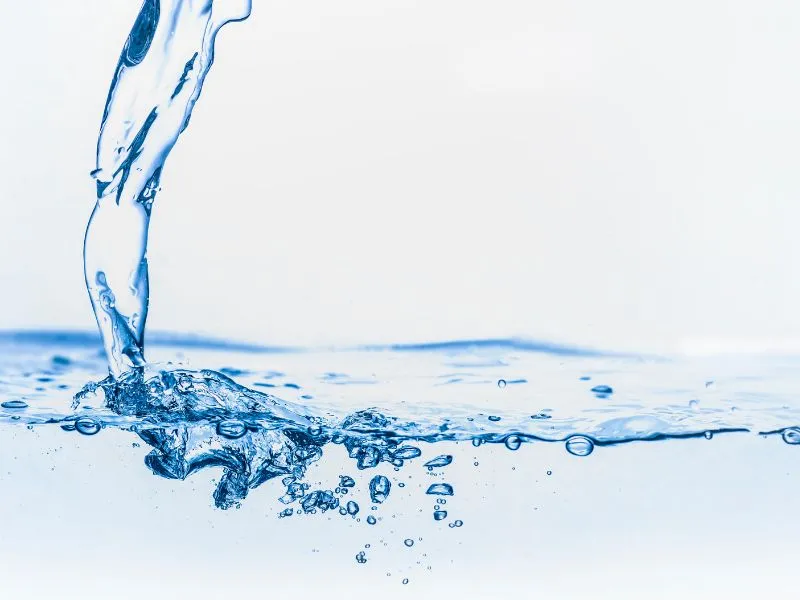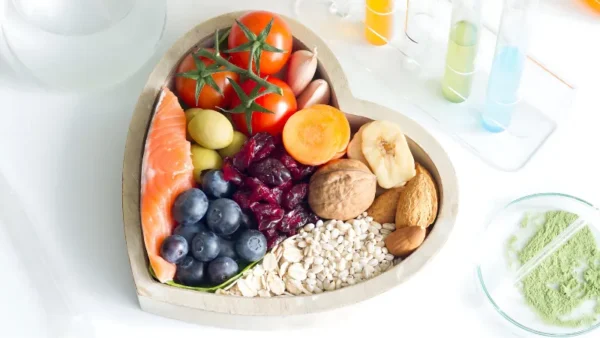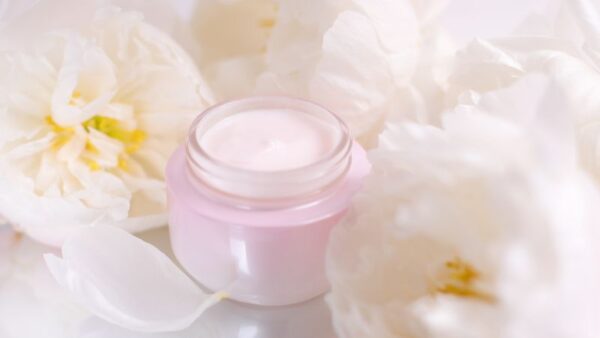What is the Healthiest Type of Filter Water?

The quality of the water you drink each day can truly impact your health and wellbeing in big ways. After all, water makes up such a huge percentage of the human body. You’re basically just a big walking water balloon! Don’t you want to nourish that water balloon with only the best water possible? Of course you do. But here’s the catch – you may not fully understand what’s coming out of your faucets and flowing into your system every time you take a sip. That’s why it’s essential to filtered water for cleaner, healthier hydration.
Keep reading!

What’s Actually Inside Your Tap Water?
There are still many concerning contaminants that can make it through treatment and into the water coming out of your faucet on a daily basis.
I’m talking about things like heavy toxic metals such as lead and arsenic, residues from pesticides and herbicides used on farms, pharmaceutical drug residues from medications people have flushed down drains, bacteria, micro worms, industrial chemicals like perchlorate originating from factories, and carcinogenic disinfection byproducts that form as a result of chlorine treatments. Not exactly things you want to be ingesting on a regular basis!
After all, the Environmental Working Group identified 22 known carcinogens in tap water samples taken from 48,000 public water systems in the US. Not cool!
Even if you don’t think one glass of contaminated water is enough to be seriously unhealthy, consider what that contaminated water is doing to your body on a day-to-day, month-to-month, year-to-year basis. Studies have revealed that long-term tap water consumption is linked to an increased risk for serious illnesses such as:
- Various forms of cancer – gastrointestinal, bladder, rectal, breast
- Developmental and reproductive problems ranging from infertility to birth defects
- Liver and kidney damage
- Adverse impacts on the nervous system
With odds like that, do you feel good about slurping strange tap water that might be still making sneaky calls on your body? No, you probably don’t.
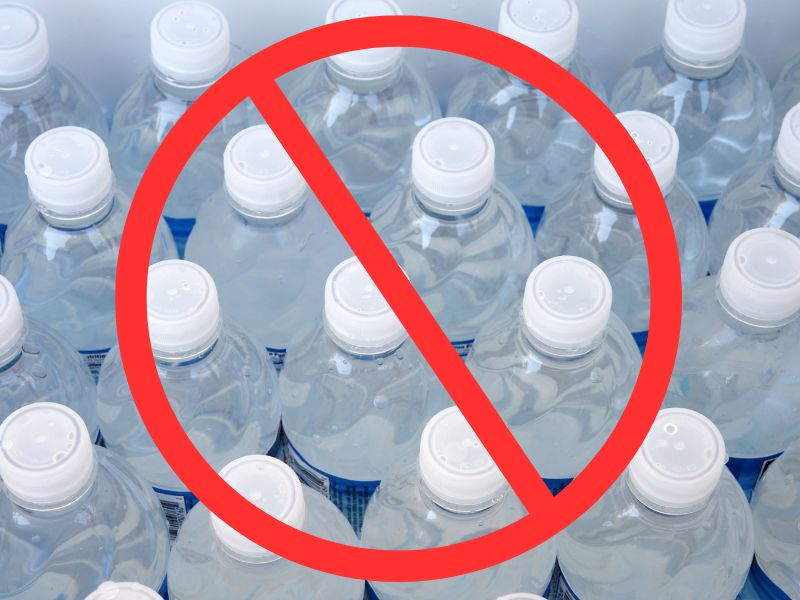
The False Sense of Purity from Bottled Water
In the sleek and shiny ads, bottled water is draped in an aura of purity – fresh and pristine, without a smudge or speck.
In fact, there are numerous scientific studies showing that some brands of bottled water contain worrisome levels of heavy metals, such as arsenic. And it’s estimated that really teeny-tiny micro plastics are shedding from the plastic bottles and then leaching into the water – not terribly appealing.
Here’s another one: up to 45% of bottled water comes ‘straight’ out of municipal or public water supplies, as opposed to being sourced at the bottle outlet. This is the same stuff that may provide your household with its water, poured into a plastic bottle and sold back to you at enormous markup. Not so pure now, is it?
And get this – public tap water is actually subject to much stricter oversight and regulations compared to bottled water. So you could conceivably end up drinking potentially contaminated water in those convenient plastic bottles that would have been caught and treated if it went through public filtration systems.
A bit ironic, don’t you think?
In summary, while it may seem on the surface like bottled water would offer purity and safety, a deeper look reveals it to be much more precarious than many consumers realize.
Take Control with In-Home Water Filtration
Alright, so clearly neither tap water nor bottled water provide the level of purity you’d ideally want for what you nor your loved ones are drinking day in and out. But have no fear – there is a solution to take control into your own hands.
That solution is filtering your water yourself at the point of use in your own home. This allows you to remove the myriad impurities of concern and ensure complete peace of mind about what’s flowing into your glass and your body. Now that’s smart hydration!
Of course, not all water filtration is created equal. If you really want top-tier purification, you need to look into installing a reverse osmosis or RO system.
Reverse osmosis utilizes these incredible high-tech membranes that act like selective bouncers at the doors of a swanky club, keeping out all the undesirables while exclusively allowing the good stuff through. The result is exquisitely pure water filtered to an exponentially higher degree than any other method – we’re talking removal of up to 99% of all dissolved solids and impurities.
But even among RO systems, there can be tremendous variability in quality and filtration capabilities. Allow me to introduce you to one option that rises far above the rest when it comes to performance…
What Makes AquaTru Stand Out
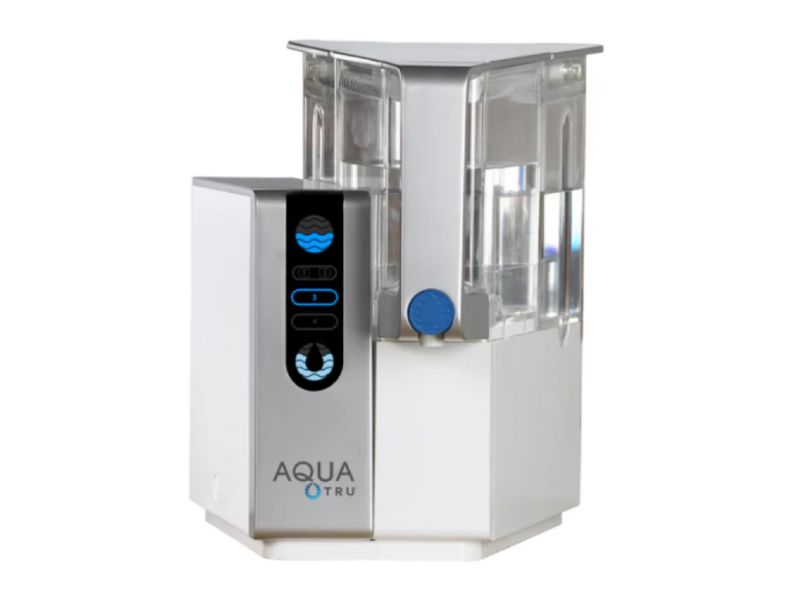
The AquaTru Classic Reverse Osmosis System is hands down one of the most technologically advanced home water filtration systems available today. It leverages a cutting-edge 4-stage purification process that far surpasses nearly any other RO system on the market.
Here is an overview of how it works:
Stage 1 – Sediment Pre-Filter: Captures all the larger particulate contaminants present in your tap water like sediment, dirt, rust particles, and silt. All that muck has no place in your drinking water!
Stage 2 – Carbon Pre-Filter: Removes residual disinfecting chlorine and chloramines, which both impact taste/odor and can form harmful byproducts. Makes your water taste significantly more fresh and palatable.
Stage 3 – RO Filtration: This is the heart of the system right here. The high-rejection RO membranes block passage of up to 99% of dissolved impurities and contaminants while exclusively allowing purified water molecules to flow through into your glass.
Stage 4 – Carbon Post-Filter: Provides vital final polishing to remove any last traces of taste or odor issues and ensure your water is as pristine as can be.
Leveraging this meticulous 4-stage process, the AquaTru is proven to remove over 80 specific water contaminants of concern, including:
- Lead
- Arsenic
- Chromium compounds
- Copper
- Radium
- Chlorine disinfection byproducts
- Residues from pesticides & herbicides
- Traces pharmaceutical drug compounds
- Microplastics from aging pipes and bottles
But hang on, because the AquaTru purification capabilities go far above and beyond even stringent industry standards, as we’ll discuss next…
AquaTru Surpasses Industry Standards
There is an NSF certification that many water filtration systems aim to achieve as a measure of quality. To attain NSF certification, a system must demonstrate the ability to remove 57 identified water contaminants. Sounds pretty solid, right?
Well, hold on, because independent laboratory testing confirms that the AquaTru system can remove over 370 distinct water contaminants! That’s more than 6 times higher than the NSF standard. Simply remarkable!

Even better, the AquaTru system filters out up to 15 times more impurities than popular pour-through pitcher style filters. And it leaves expensive bottled waters in the dust when it comes to the breadth of contaminants removed.
Imagine being able to simply turn on your faucet anytime and fill up a refreshing glass, with the confidence of knowing that water has been purified to the maximum extent possible. The AquaTru delivers true peace of mind when it comes to your family’s drinking water.
The Convenience of Having AquaTru
Clearly, the AquaTru is in a class of its own when it comes to high-performance water filtration. But it was also ingeniously designed for user-friendly convenience:
- No installation required – the AquaTru sits neatly on your kitchen counter ready to use immediately, no tools or complicated setup needed.
- Compact footprint – at just 14 inches wide x 12 inches deep, it tucks away nicely on your counter without hogging valuable space.
- On-demand filtered water – simply press the button and it dispenses freshly purified water directly into your glass or container.
- Rapid production – the system can churn out a full gallon of purified drinking water in only 12 to 15 minutes. You’ll never have to wait long for tasty AquaFresh.
- Low maintenance requirements – the filter cartridges only need to be changed an average of once or twice per year for continuous performance.

Give Your Body the Best Water Possible
Now that you understand what’s in your tap water and the limitations of bottled water, it’s clear you owe it to yourself and your family to have access to the highest quality drinking water possible.
After all, your body is comprised of over 60% water. The water you put into it daily plays a huge role in all aspects of your health and vitality. Contaminants from questionable water sources can silently accumulate in the body over months and years, leading to problems down the road.
With AquaTru, you can stop worrying and start enjoying pure, refreshing water that truly nourishes your body the way nature intended.

Imagine being able to grab a nice cold glass of water from your tap whenever you’re thirsty, and actually feeling good about drinking it. Or starting your morning with a tall glass of AquaTru water to rehydrate and kickstart your day.
Final Verdict
Tap water could have traces of who-knows-what in it. Bottled water may seem pure, but is far less regulated and monitored than public supplies.
AquaTru eliminates any doubts by giving you only the cleanest, freshest water filtered to an exceptional level you won’t find anywhere else. Why settle for less when it comes to your health and the health of your loved ones?
Bring the AquaTru reverse osmosis system into your home today and find out what high-quality H20 can do for your mind, body, and overall quality of life. Taste the difference it makes in hydrating cooking, coffee, tea, and more.

1. Can I filter hot water for drinking?
It’s not recommended to run already hot water through water filtration systems. Allow the water to run cold first, then filter it once cooled. The heat can damage filter components.
2. Does reverse osmosis remove beneficial minerals?
RO filtration does remove dissolved mineral salts along with contaminants. But you can add back in minerals if desired by adding a pinch of unrefined sea salt to your glass of RO water.
3. Is it okay to filter water before boiling it?
Absolutely, in fact it’s great to filter water first before boiling. This ensures any impurities present won’t be concentrated when the water boils away. Pre-filtering leads to purer boiled/distilled water.
4. What does a reverse osmosis system’s rejection rate mean?
The rejection rate refers to the percentage of dissolved impurities that the RO membrane filters out. A rejection rate of 90% means 90% of contaminants are stopped by the membrane.
5. Can water filtration systems breed bacteria?
All systems should be kept clean according to instructions to prevent bacterial growth. RO systems in particular have built-in antibacterial protections that inhibit microorganisms.
6. Does filtered water taste as good as spring water?
Yes! High-quality multi-stage filtration like reverse osmosis can make plain tap water taste as crisp, refreshing and mineral-rich as the best spring waters.
7. Is filtration necessary if I have well water?
Private well water is not regulated or treated, so filtration is highly recommended to protect health from pathogens, heavy metals, minerals, etc. present in wells.

